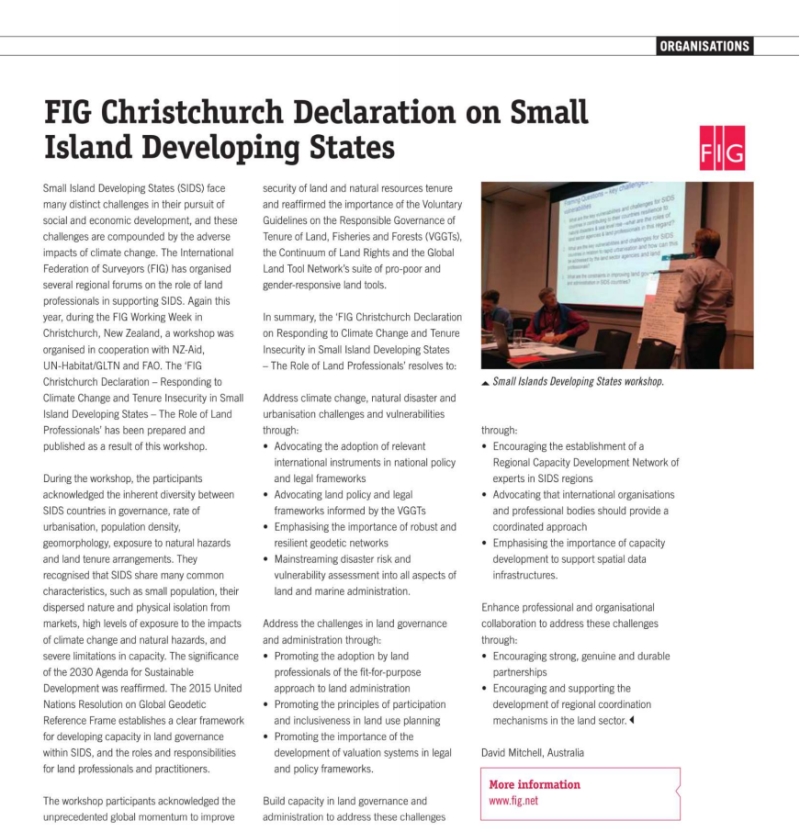Small Island Developing States (SIDS) face many distinct
challenges in their pursuit of social and economic development and these
challenges are compounded by the adverse impacts of climate change.
The International Federation of Surveyors (FIG) has organised several
regional forums on the role of land professionals in supporting SIDS.
Again this year a workshop took place. The workshop is entitled
“Responding to Climate Change and Security of Tenure in Small Island
Developing States: The Role of Land Professionals”.
The key topics will be:
A report from the workshop has been published in GIM-International

In summery, the "FIG Christchurch Declaration on Respondind to Climate Change and Tenure Insecurity in Small Island Develping States - The Role of Land Professionals' resolves:
Address climate change, natural disaster and urbanisation challenges and vulnerability through:
Address the challenges in land governance and administration throuigh:
Build capacity in land governance and administration to address these challenges through:
Enhance professionl and organisational collaboration to address these challendes through:
Supported by:
BackgroundA key outcome of the Third international Conference in Small Island Developing States in Apia, Samoa (1-4 September, 2014) was the Small Island Developing States Accelerated Modalities of Action (the ‘Samoa Pathway’). The Samoa Pathway reaffirmed commitments made under key UN conferences1 and, as well as those programmes of action specific to SIDS2. The Samoa Pathway also reaffirmed that SIDS are a special case for sustainable development in view of their unique and particular vulnerabilities, and are constrained in meeting their goals by economic, capacity and geographical challenges. The Samoa Pathway also recognizes that sea-level rise and other adverse impacts of climate change continue to pose a significant threat to SIDS and their efforts to achieve sustainable development, and “for many, represent the gravest of threats to their survival and viability, including,for some, through the loss of territory”. The adverse impacts of climate change compounds existing challenges for SIDS and places additional burden on national budgets in their efforts to achieve sustainable development goals. International cooperation (including from the UN system) and genuine and durable partnerships were seen as critical to the implementation of sustainable development in SIDS. The third United Nations Conference on Housing and Sustainable Urban Development (Habitat III) will be convened in Quito, Ecuador, in October 2016, to focus on the implementation of a “New Urban Agenda”. The United Nations Conference on Sustainable Development (Rio+20) agreed to launch a process to establish universal Sustainable Development Goals (SDGs), that will be an integral part of the Post-2015 Development Agenda. The Sixth Asia Pacific Urban Forum (APUF-6) will take place from 19-21 October 2015 in Jakarta, Indonesia, back-to-back with the High-level Regional Preparatory Meeting to Habitat III for Asia Pacific on 22-23 October. Both meetings provide a key opportunity to articulate and shape the new Asia and Pacific urban policy agenda against the backdrop of the new Sustainable Development Goals. In response to the challenges facing SIDS in achieving sustainable development goals, and the imperatives for international support outlined in the Samoa Pathway, the International Federation of Surveyors (FIG) – with support from international multi-lateral partners - have organised several regional forums on the role of land professionals in supporting SIDS. In 2010 a 2-day SIDS Seminar was held over five sessions at the FIG Congress in Sydney 2010. The seminar was organised under the broad themes of “Building Professional Capacity”, “Climate change and natural disasters”, “Good Governance in Land Tenure and Administration” and “Access to Land, Coastal and Marine Resources”. Around 60 persons participated in the seminar as well as many interested observers from the Congress. Of the invited people, 33 were funded by FAO, the Commonwealth Foundation, AusAID and NZAID. The major outcome of this seminar was FIG Publication 53 “Sydney Agenda for Action: Small Island Developing States and the Millennium Development Goals: Building the Capacity”. The Sydney Agenda for action emphasised the importance of good land governance especially in relation to climate change and natural disaster, access to land and resources, secure tenure and land administration. The Agenda for Action provided guidance on vehicles for developing capacity, roles and responsibilities for land professionals, and institutional responsibility for driving the agenda. The Pacific Island Land Professionals Association (through the President Dr Mele Rakai) was actively involved in the organisation of the workshop and the development of the Sydney Agenda for Action. In September 2013 a follow-up symposium jointly organised by FIG, FAO, GLTN, UN-HABITAT and UN-GGIM-AP3was held in Suva, Fiji that aimed to build upon the discussions in Sydney in 2010. The title of two-day FIG Pacific Small Island Developing States Symposium was ‘Policies and Practices for Responsible Governance’ and the themes included “improved governance of tenure of land, fisheries and forests”, “Geospatial information management” and “Secure land and property rights for all”. Cross-cutting themes included capacity development, professional development and climate change. This symposium was attended by 72 participants from 21 countries (including from nine Small Island Developing States). FAO sponsored 9 International participants, 6 presenters and 3 participants from 8 different SIDS. While, 6 local Fiji participants were also sponsored. There were also several participants who had also participated at the 2010 seminar in Sydney. The aim was to share knowledge, promote understanding and enhance cooperation and the outcome of this symposium was the FIG “Suva Statement on Spatially Responsible Governance”. |
Inspiration:
FIG Pacific Small Island Developing States Symposium - Proceedings |